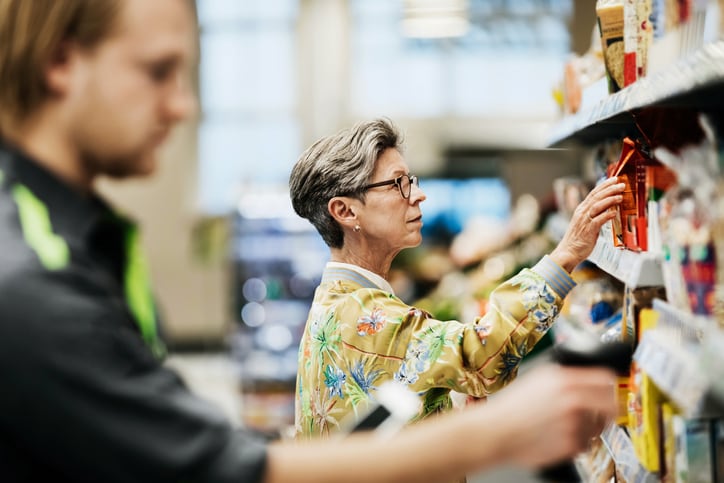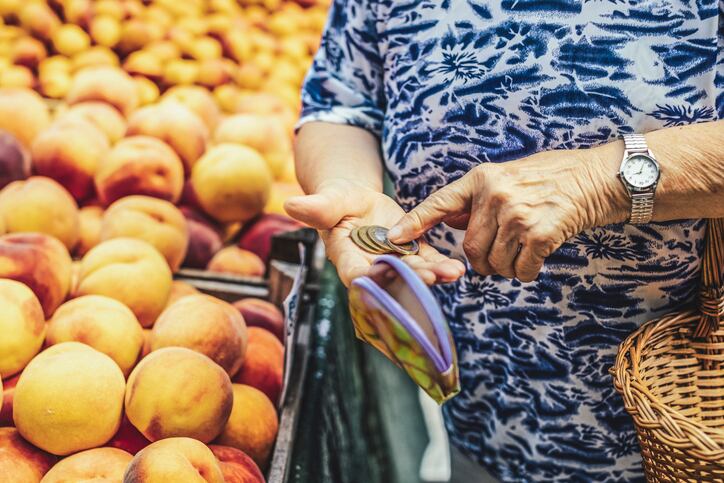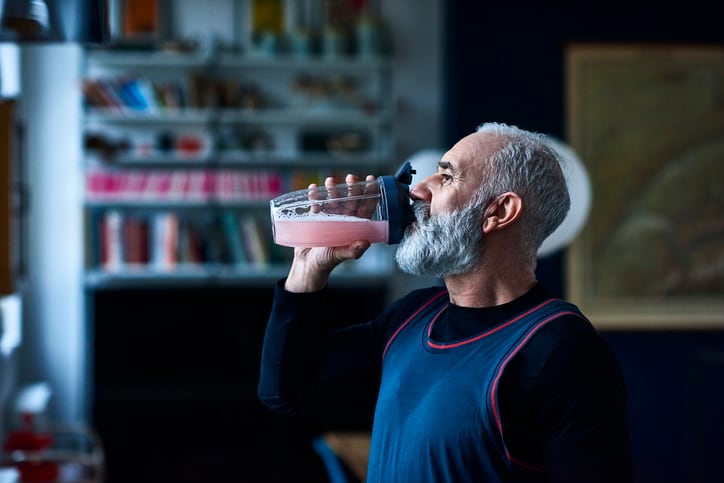Private labels account for €194 bn, making up 35% of total FMCG value sales in Europe as the gap narrows between national brands, the researcher revealed.
Around 50% of shoppers switch between both, with most now appearing in the mid-income bracket, but also with high-income cohorts in France and Germany, according to IRI’s latest report – Private Labels: Hiding in Plain Sight. Private label shoppers are looking beyond price. Where they intend to spend more or less in 2022 and beyond, is in line with wider category trends.
Modern private label brands have evolved from their origins 40 years ago and developed into strategy-focused, differentiated, data-driven and consumer-obsessed brands, the report noted. Private labels are gaining ground in value sales, market penetration, consumer value and retail experience, while closing the gap on instantly recognizable national labels.
According to IRI, private labels now occupy a global category footprint of 16.5% of FMCG value sales. Driven by several growth factors, private labels are said to offer the same or better quality, affordability, healthier options, consumer acceptance and portfolio stratification into Premium.
With the highest penetration in Spain (44%) and Germany (38%), private labels make up 35% of total FMCG sales in Europe, equating to €194 bn. Germany records the highest absolute value (around €60 bn) followed by the UK (€43 bn).
Consumer acceptance
Retailers have transformed private labels into a well-established global phenomenon. First launched in the 1980s as ‘no-brand generics’, private labels then developed into overtly price-led ‘discount’ brands, followed by ‘everyday value’ and ‘essentials’ as every-day-low-price (EDLP) products became more widespread.
Private labels have become a substitute in several growth categories for many national brands having undergone significant transformation that focusses on quality, trust, environmental credentials, innovation and delivery on claims.
From their humble discount-focussed beginnings, over the past five years private labels have become “formidable competitors” to the brands, despite the drop in the pandemic, said Ananda Roy, SVP, Strategic Growth Insights, IRI International and author of the report.
"What we see now are private labels that are very customer focussed, strategy obsessed, differentiated and data informed,” noted Roy.
Cost of living crisis fuelling private label counter-attack
The private label counter-attack has also come partly thanks to rising inflationary pressures. Consumer buying behaviour amid pandemic chaos provided a transient boost to national brands, causing private label value sales to fall. During 2018-2019, private labels experienced strong value sales growth, (+8% and +11.3% respectively) however this tapered off during the early stages of the COVID-19 health crisis as consumers opted for trusted national brands amid uncertainty - value sales dropped -1% in 2020 (value share 35.2%) and -1.4% in 2021 (value share 34.6%).
However, there is a distinctly positive outlook ahead as this trend is likely to be dampened and possibly reversed as national brands raise prices to counter inflationary headwinds and private labels return to growth.
“Now that the national brands are being forced to increase their prices it is very likely that private labels will grow as consumers facing a cost of living crisis are heavily influenced by deals,” explained Roy. “Private labels are hiding in plain sight.”
He added: “Private labels may not be instantly recognizable brand names, but the fact is they don’t need to be. Retailers have re-imagined what consumers can expect from them in every supermarket aisle. They offer considerable value to shoppers who are not entirely price-driven by delivering quality, product performance and premium innovations which are comparable to the bigger, more established national brands.
“They compete for growth and margin on near equal terms and often present worthy competitors that are perhaps not fully acknowledged by the big brand owners. Private label brands are basically hiding in plain sight.”
Price wars looming
So much so that price wars looming, he cautioned. Small and mid-sized manufacturers are likely to lose consumers, volume and value to large manufacturers and private labels who are expected to mitigate inflation and maintain availability, despite ingredient shortages and supply-side disruptions. This creates the real possibility of price wars in the remaining half of 2022 with private labels having the potential to capitalise on inflationary trends.
"If your price mitigation strategy doesn't take into account the very real prospect of price wars in the second half of the year, we would argue it's not complete,” warned Roy.
Actions for manufacturers and retailers
- As private label enters 2022 with a competitive tailwind, IRI has outlined several strategic opportunities and actions:
- Induce shoppers by trial and conversion of the 50% that regularly switch between private label and national brands.
- Further mining of loyalty data to enrich shopper segmentation and tracking.
- Invest more in retailer media to personalize promotions, experiences and track effectiveness.
- Promote private labels as ‘better value’ based on quality, trust, innovation and sustainability credentials.
- Make shopping for private labels quick, easy and fun by ensuring transparent pricing and clean labelling that helps clarify range, endorsements, innovative packaging and merchandising.
- Disrupt product experience and route-to-market which are less easily substituted.
- Partner with quick commerce leaders to create higher margins, bypass brands and distributors and create opportunities to offer a wider range of food and non-food products.
Innovation is the new battleground
Private labels are often leading innovation in high-margin categories, such as Bakery, Beverages, Beauty, Vitamins and Supplements and over the counter healthcare remedies. IRI’s research showed that consumers found shopping in-store for private labels easier owing to clean labelling and clear ingredients. This made the experience more enjoyable and less confusing than having to shop amongst the confusing array and proliferation of packs, offers and formats among national brands. Shoppers say the gap between private label and national brands is narrower still when shopping online due to the platforms and mechanics being identical.
New innovations will make private labels even more competitive as they take advantage of quick commerce, shoppable recipes, meal kits and leveraging retail media, all of which offer new routes-to -market, attraction of higher-income shoppers and lower cost-of-sales.
Beyond retailers, quick commerce players are now creating their own private labels, as seen recently in the UK by the launch of Jiffy’s bakery range. The ultrafast online supermarket has launched in-house bakeries at three of its dark stores in east London. Products include breakfast pastries such as pain au chocolat and croissants, alongside a selection of fresh bread. The items are ‘baked to order’ and then distributed to customers.





